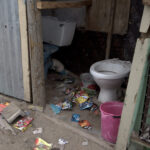Between understanding medical terminology and decoding legal documents, reporting on negligence cases can be complicated. A media lawyer shares her expert tips for journalists.
Resource details:
Publication title: Covering cases of alleged medical negligence in an ethical manner
Authors: South African Press Council, South African National Editors Forum, Bhekisisa Centre for Health Journalism
Publication date: 26 November 2020
What this resource is about:
This resource summarises one of the presentations made during a webinar of the South African Press Council, the South African Editors Forum and the Bhekisisa Centre for Health Journalism. The presentation, of the media lawywer, Okyerebea Ampofo-Anti, gives practical, legal tips for reporting on cases of alleged medical negligence. The full webinar can be viewed here. The webinar was moderated by Bhekisisa’s editor-in-chief, Mia Malan, and the panelists included Ampofo-Anti, Media 24’s press ombudsman, George Claassen, the president of the Health Professions Council of South Africa (HPCSA), Kgosi Letlape, and the Durban-based orthopaedic surgeon, Rinesh Chetty.
Key takeaways:
1. Get acquainted with the legal definition of ‘negligence’
- Reporting that someone was negligent means that person has not acted in a manner that a reasonable professional in that position would have acted, says media lawyer Okyerebea Ampofo-Anti.
- In other words, the doctor neglected or omitted care that resulted in harm to the patient, according to the Medical Protection Society’s website.
- The fact that somebody died, or has been injured or harmed does not necessarily equate to negligence, Ampofo-Anti cautions.
- It’s important to remember that every operation is potentially life-threatening, she says. In hospital, doctors will always inform their patients that even a simple procedure could go wrong.
2. Language matters: Steer clear of these words to avoid a defamation lawsuit
- In South Africa, defamation is the wrongful and intentional publication of a statement that will tarnish the reputation of a person in the eyes of their community.
- For this reason, Ampofo-Anti says, journalists must choose their words carefully. “Those words in your article or your broadcast are going to be individually scrutinised. What would a member of the public who hears those words that you chose, understand you to be alleging about that doctor?” she explains.
- “If you publish a statement that a doctor has been negligent, that would be seen as a defamatory statement.” That’s because calling a doctor negligent has an impact on their reputation. “The harm is potentially very severe because it could lead to the end of that doctor’s career and it could lead to the end of their business.”
- The damage of irresponsible reporting can last long after your story is published, Ampofo-Anti says. “Members of the public could choose to avoid them even before they are found guilty in a court process or HPCSA process based on your reportage.”
- Journalists should refrain from framing a bad medical outcome as a “routine operation” that nonetheless ended badly for the patient. She explains: “The fact that [the operation] should have been simple doesn’t prove anything [about the doctor’s conduct].”
- One way to get around this blunder is to get an expert to comment on the nature of the procedure mentioned in your story.
- Stay away from words such as “botched” or “killed” when you’re reporting on complaints against health workers.
3. The public interest, truth and reasonable publication – these are your three best defences in court
- A story about medical negligence can lead to a defamation case in court, or a complaint to the Press Council or the BCCSA, Ampofo-Anti says. Once you get to court, there are three main defences journalists can use.
- Your first defence – is your story in the public interest? A story about medical negligence is almost always in the public interest. Why? “If a doctor is misconducting themselves, any member of the public can fall into their hands and be harmed. It’s in the public’s interest to be aware of what has happened,” Ampofo-Anti explains.
- Secondly – is your story true? When it comes to truth, the devil’s in the detail. Say for example, that your story states that the patient arrives at 06:00 and the doctor only saw them at 06:30. If that waiting time is crucial to the outcome of the patient, and you got it wrong, it is a substantial inaccuracy and untruth, Ampofo-Anti warns.
- Lastly – make sure you can show that you have taken the necessary steps to put the story together in an ethical way. The court will look at a host of factors to determine whether the report is reasonable or not.
- These factors include whether the story is balanced, whether the tone of the story is fair. In addition, the court will investigate how reliable your sources are, she says. The steps you’ve taken to verify the information in the story will also come under scrutiny.
4. A defamatory story can mean trouble for everyone involved
- Every person in the chain of publication can be held liable in a defamation case. Ampofo-Anti says this includes the patient who made the allegation, the journalist who wrote the story, and the publisher or broadcaster who ultimately put out the story.
- “Strictly speaking, [legal liability] can even go as far as the store that carries copies of that newspaper.” But that hardly ever happens in reality, she says.
- In most cases, publications won’t throw their journalists under the bus. The publication will usually take the responsibility for a defamatory story by paying legal fees and other damages awarded against the reporter, Ampofo-Anti says. She warns: “That’s not to say you shouldn’t be concerned, because your reputation as a journalist is also on the line.”
5. Don’t judge ‘no comment’ too harshly
- In many cases, journalists view people who decline to comment with “a cloud of suspicion”, Ampofo-Anti says. But when it comes to doctors and hospitals, responding to media queries isn’t as simple in medical negligence cases as it is in other scenarios since medical professionals are legally constrained. She explains “Ethically, they are not allowed to disclose the details of a medical process to third parties, even from a legal point of view in terms of the National Health Act,” Ampofo-Anti says.
- Journalists must be mindful about the tone they use to illustrate the health workers’ failure to respond in the article. She explains: “It shouldn’t be positioned as some kind of stonewalling by them. That [would be] reasonable publication.”
[WATCH] Okyerebea Ampofo-Anti’s full presentation
- WATCH THE FULL WEBINAR here.
- Download the BCCSA code of conduct here.
- Download the Press Council code of ethics here.















